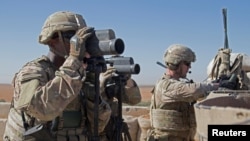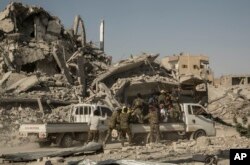The Syrian government has applauded U.S. President Donald Trump's decision to withdraw U.S. troops from Kurdish regions in the north of Syria. Meanwhile, Kurds have condemned the decision, and the regional U.S. Arab allies are divided over the move.
Syrian government analyst Col. Ali Maqsoud told state TV the U.S. decision was prompting a new sort of national unity by Kurds and others who want the central government to defend them against a Turkish invasion.
He said the Kurds had learned that unless they join up with the central government, they will face a Turkish offensive alone, and the possibility of that happening has prompted what he called an uprising.
In the northeastern city of Hasaka, part of which is under Syrian government control, Kurdish civilians staged street protests in support of President Bashar al-Assad's government, according to Syrian TV. VOA could not independently verify those reports.
SDF dismayed
The Kurdish-dominated alliance known as the Syrian Democratic Forces, or SDF, has been fighting alongside the U.S. military to defeat Islamic State militants in the north and east of Syria. The SDF indicated within the past few days it was still fighting to drive out the last IS fighters from the eastern town of Hajin, near Deir el-Zour.
The SDF's media office voiced dismay about Trump's decision to withdraw from Syrian Kurdish areas, which the Kurds affectionately call Rojava. The SDF tweeted a short patriotic video of a Syrian Kurdish flag flying over territory the group controls, sporting the hashtag #DoNotAbandonRojava.
A Syrian opposition leader now based in Turkey, George Sabra, told Arab media, "Opinion is divided, and some Arabs are condemning Trump's decision, while others are applauding it."
Several countries that support the Assad government, like Algeria, Lebanon and Iran, indicated they hoped Damascus would regain control over the northern Kurdish territories, while the Turkish defense minister, Hulusi Akar, said his forces would "bury the Kurdish [SDF] fighters in their trenches, when the time comes."
Turkey doesn't like the SDF because of fears Kurdish separatists on its own soil will spark a push for independence in the heavily Kurdish regions in the southeastern part of the country. An outlawed group known as the PKK has been engaged in a bloody war with the Turkish military for three decades. Both Ankara and Washington consider the PKK a terrorist organization.
Allies unprepared
University of Paris professor Khattar Abou Diab told VOA that U.S. allies were not prepared for Trump's decision, despite the fact Trump had campaigned on a pledge to pull out of Syria and repeated it earlier this year.
He said friends and allies of America, including Israel and many Arab states, have come to expect over the years that the United States will do their dirty work and pay for it for them. This time, he said, they were not prepared for the U.S. decision.
Egyptian political sociologist Said Sadek told VOA that the United States had tarnished its image among its allies in the region.
"Definitely, the image of the United States as a stabilizer in the area, as someone who stands by his allies, is over. Maybe the Americans wanted the people of the area to fight against each other," Sadek said.
Following Trump's withdrawal decision, the Lebanese editor of the Saudi-owned Asharqalawsat newspaper, Ghassan Charbel, tweeted, "Countries that sleep on American pillows will no longer be able to sleep soundly."





